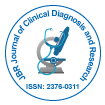Review Article
Simple Molecular Diagnostic Tools in Clinical Medicine
*Corresponding Author: Hyung-Soo Han, Department of Physiology, Kyungpook National University School of Medicine, 680 Gukchaebosang-ro, Jung-gu, Daegu, 41944, South Korea, Tel: 82-53-950-4214, Fax: 82-53-314-0410, Email: hshan@knu.ac.krReceived Date: Jul 04, 2017 / Accepted Date: Jul 25, 2017 / Published Date: Jul 28, 2017
Citation: Choe JY, Kim JK, Han HS (2017) Simple Molecular Diagnostic Tools in Clinical Medicine. J Clin Diagn Res 5: 141.
Copyright: © 2017 Choe JY, et al. This is an open-access article distributed under the terms of the Creative Commons Attribution License, which permits unrestricted use, distribution, and reproduction in any medium, provided the original author and source are credited.
Abstract
Background: Advances in genetic/genomic studies have been a robust driving force in the field of clinical medicine, particularly in the diagnostic field. Although ambitious efforts to elucidate all aspects of the genome have shown remarkable progress, there are numerous practical unmet needs in the clinic. To facilitate the use of genetic/ genomic research outcomes for patient treatment, simple, inexpensive, and convenient tools are essential. However, accurate and precise outcomes cannot be compromised to achieve convenience, and the performance of the simple molecular diagnostic tools should fulfil all basic requirements.
Objective of the review: In this review, current trends in molecular diagnosis are described, and future perspectives are suggested.
Discussion and conclusions: In the future, an optimal diagnosis system that can analyze the body status with just with a single drop of blood is expected to be developed. However, a simple, inexpensive, and portable molecular diagnostic tool is currently required. It is not easy to predict which type of diagnostic tools will become dominant, but POCT with molecular diagnostic functions is a strong candidate.

 Spanish
Spanish  Chinese
Chinese  Russian
Russian  German
German  French
French  Japanese
Japanese  Portuguese
Portuguese  Hindi
Hindi